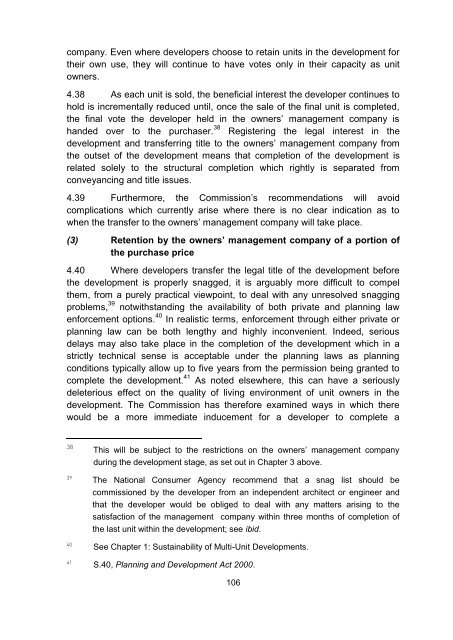Report on Multi-Unit Developments - Law Reform Commission
Report on Multi-Unit Developments - Law Reform Commission
Report on Multi-Unit Developments - Law Reform Commission
Create successful ePaper yourself
Turn your PDF publications into a flip-book with our unique Google optimized e-Paper software.
company. Even where developers choose to retain units in the development for<br />
their own use, they will c<strong>on</strong>tinue to have votes <strong>on</strong>ly in their capacity as unit<br />
owners.<br />
4.38 As each unit is sold, the beneficial interest the developer c<strong>on</strong>tinues to<br />
hold is incrementally reduced until, <strong>on</strong>ce the sale of the final unit is completed,<br />
the final vote the developer held in the owners‘ management company is<br />
handed over to the purchaser. 38 Registering the legal interest in the<br />
development and transferring title to the owners‘ management company from<br />
the outset of the development means that completi<strong>on</strong> of the development is<br />
related solely to the structural completi<strong>on</strong> which rightly is separated from<br />
c<strong>on</strong>veyancing and title issues.<br />
4.39 Furthermore, the Commissi<strong>on</strong>‘s recommendati<strong>on</strong>s will avoid<br />
complicati<strong>on</strong>s which currently arise where there is no clear indicati<strong>on</strong> as to<br />
when the transfer to the owners‘ management company will take place.<br />
(3) Retenti<strong>on</strong> by the owners’ management company of a porti<strong>on</strong> of<br />
the purchase price<br />
4.40 Where developers transfer the legal title of the development before<br />
the development is properly snagged, it is arguably more difficult to compel<br />
them, from a purely practical viewpoint, to deal with any unresolved snagging<br />
problems, 39 notwithstanding the availability of both private and planning law<br />
enforcement opti<strong>on</strong>s. 40 In realistic terms, enforcement through either private or<br />
planning law can be both lengthy and highly inc<strong>on</strong>venient. Indeed, serious<br />
delays may also take place in the completi<strong>on</strong> of the development which in a<br />
strictly technical sense is acceptable under the planning laws as planning<br />
c<strong>on</strong>diti<strong>on</strong>s typically allow up to five years from the permissi<strong>on</strong> being granted to<br />
complete the development. 41 As noted elsewhere, this can have a seriously<br />
deleterious effect <strong>on</strong> the quality of living envir<strong>on</strong>ment of unit owners in the<br />
development. The Commissi<strong>on</strong> has therefore examined ways in which there<br />
would be a more immediate inducement for a developer to complete a<br />
38<br />
This will be subject to the restricti<strong>on</strong>s <strong>on</strong> the owners‘ management company<br />
during the development stage, as set out in Chapter 3 above.<br />
39<br />
The Nati<strong>on</strong>al C<strong>on</strong>sumer Agency recommend that a snag list should be<br />
commissi<strong>on</strong>ed by the developer from an independent architect or engineer and<br />
that the developer would be obliged to deal with any matters arising to the<br />
satisfacti<strong>on</strong> of the management company within three m<strong>on</strong>ths of completi<strong>on</strong> of<br />
the last unit within the development; see ibid.<br />
40<br />
See Chapter 1: Sustainability of <strong>Multi</strong>-<strong>Unit</strong> <strong>Developments</strong>.<br />
41<br />
S.40, Planning and Development Act 2000.<br />
106

















